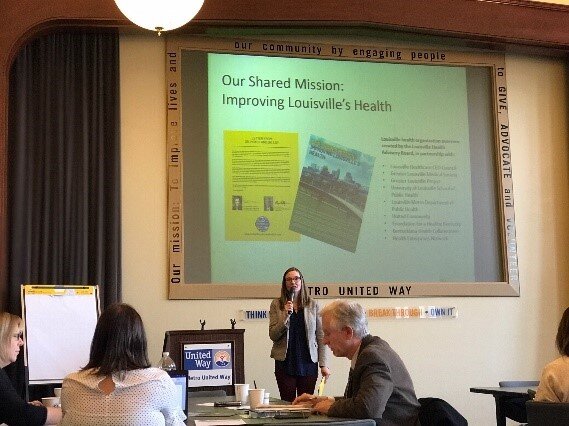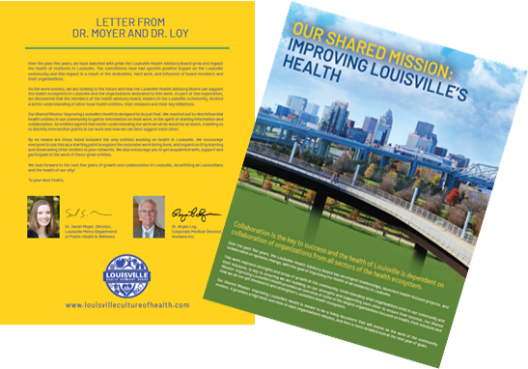On December 5, forty-two community partners representing twenty-three social service, healthcare, and educational organizations gathered to celebrate the accomplishments of another year, banded together by a collective mission to improve the health of Louisville.
Louisville Health Advisory Board co-chairs Dr. Bryan Loy, Corporate Medical Director, Humana and Dr. Sarah Moyer, Director of the Louisville Department of Public Health & Wellness, welcomed the group and Dr. Moyer highlighted a new tool created by the LHAB in partnership with nine other health organizations across the city. Our Shared Mission: Improving Louisville’s Health is designed to provide education for the community on key entities working towards a healthier Louisville, increase awareness and understanding of respective missions and initiatives, and increase collaboration and support of one another’s work.
Next, London Roth, Louisville Population Health leader for Humana and Bruce Jeffery, Executive Director of the Republic Bank Foundation YMCA, shared highlights from the Robert Wood Johnson Foundation Culture of Health Prize Learning and Celebration Event, which took place in Princeton, NJ November 11-13. The Culture of Health Prize honors and elevates American communities making great strides in their journey toward better health. In 2016 the Community Foundation of Louisville, Greater Louisville Project, Center for Health Equity, IDEAS xLab – with the support of many other organizations – submitted an application and were selected as a Prize winner, which affords them the opportunity to forever be part of a cohort comprised of past and present winners regularly convening to learn from one another. Roth and Jeffery represented Louisville in this year’s event, sharing progress in our community and learning from others. Key themes across all communities included the intersection between health and housing, economic development, equity, balancing immediate needs with upstream opportunity, and engaging youth. Jeffery shared that equity goes beyond housing and economics; it includes race and that is a conversation that needs to continue. Louisville is in the same fight as many other communities to improve, and all communities are asking the tough questions about how we do that.
The group then had the opportunity to hear about the new YMCA facility scheduled to open this weekend. Bruce Jeffery, new executive director of the facility, shared his background and vision for the new Y. Jeffery, originally from St. Louis, has spent his career in progressive leadership roles with the Boys and Girls Club in Decatur, IL. He has a passion for taking a holistic approach towards the health of the community, including the health and wellness of youth. The Republic Bank Foundation YMCA is a 77,000 square foot, $28 million investment located at 1720 West Broadway. Collaborating partners and tenants include Norton Healthcare, Republic Bank & Trust, ProRehab Physical Therapy, Family and Children’s Place, Gilda’s Club and Best Buy Teen Technology Center. The YMCA’s focus on strengthening community and improving health will be supported through these partnerships and the building was intentionally designed for integration and increasing social engagement. Based on his early impressions, Jeffery believes that our community is making progress with health equity and at a crossroads of needing to continue the work of collaboration and cooperation to make a significant impact on our young people and the community at large.
Click here for images of the new facility, courtesy of Louisville Business First.
Our meeting continued with details about the new Microsoft Future of Work Initiative. Ben Reno-Weber, former co-chair of the LHAB Community Coordination of Care Committee, is now the Director of Microsoft Future of Work Initiative. He shared that the last 3 tech revolutions - personal computers, internet, and mobile technology - occurred on the coasts, then slowly trickled into the mid-west and interior. This meant that similar-minded people were solving technology problems. The Brookings Institute identified Louisville as a community on the cutting edge of applying artificial intelligence (AI) in a positive way (or conversely negatively, disruptive). The work seeks to answer the question, can we use AI technology to drive economic growth and improve Louisvillians ability to stay ahead of work trends, enabling them to find better jobs, rather than be left behind by this revolution, and use data to solve the problems of social determinants of health. The initiative will be recruiting fellows to be part of an AI data cohort. They will work with local companies to explore how data can solve problems and provide opportunities to improve the lives of all residents. Ben is looking for interesting projects to focus on in the next year to showcase how working with AI and data can solve problems of social determinants of health. If you have something that may be a fit, don’t hesitate to reach out to Ben to discuss.
Mandy Simpson, Director of Engagement for Metro United Way, shared with the group the significance of the 2020 census and why it matters: dollars, data and democracy. Our state receives $15.8 billion in public funding for programs funded based on census data. Census data helps with planning for infrastructure and also determines the number of representatives we have in Congress (KY lost a seat in 1990 due to a low census count). Our state stands to lose $20,000 for every individual not counted ($2,000/year over 10 years). Simpson highlighted groups that are challenging to count, discussed the safety and privacy the information collected, and conveyed the role we can play in promoting and encouraging our networks to participate. For the first time the census will be available to complete online (printed versions will be available for those who do not complete online) and invitations to complete will begin mailing March 12, 2020.
Dr. Moyer and Dr. Loy expressed congratulations to the LHAB for sustaining engagement for nearly 5 years, and the significant impact the LHAB has had in the way we speak about health in the community, and around initiatives that will have long standing impact in our community like QPR suicide prevention training, United Community, the Wellbeing Index, and much more. There is recognition that part of any long term initiative is evolution. Dr. Loy and Dr. Moyer asked the group about their interest in exploring the evolution of the LHAB, utilizing the collective impact that was started 4 years ago, to continue this work for the next 5 years and beyond. As part of this exploration, the leaders did some preliminary research on the Blue Zones and shared that research with the group. Respecting that the work of the LHAB is community driven, Blue Zones information was shared with the group and a discussion about whether the community wanted to explore it further was had. The leadership team will continue this discussion with community members through the committee meetings and based on feedback will decide if there are next steps that the community supports.
Dan Buettner, Blue Zones founder, is a National Geographic Fellow and multiple New York Times bestselling author. He has discovered five places in the world – dubbed blue zones – where people live the longest, and are healthiest and published a book highlighting the factors unique to those communities. Since publishing the book, the Blue Zones Project was launched, bringing insights from the communities to cities across the nation.
The members of the LHAB expressed gratitude that leadership is thinking about the future work on the collective impact. Those that had heard of Blue Zones, expressed some concerns about whether the program would be a good fit for Louisville or if the community could do the work internally without having to pay for Blue Zones to bring their program. The conversation ended with the consensus that more research needed to be done including talking to other cities that have explored Blue Zones or actually worked with them, asking the local community what they want from the LHAB, and using work and research we have already done and building off of that.
This conversation is one of several that the community will be having over several months to ensure that the work continues to be community driven and focused.
Committee Updates:
The quarterly meetings are an important way for committees – who are meeting monthly to advance research, pilots and initiatives related to their focus area – to learn about each other and identify relevant intersection points.
Community Coordination of Care – Tom Walton, Executive in Residence, University of Louisville, highlighted the continued implementation of PRAPARE pilot at Family Health Centers, sustained support for United Community initiative and focus on food insecurity, housing (Respite to Residence program) and transportation.
Behavioral Health – Joe Bargione Ph.D., Licensed Psychologist shared that there is a decrease in life expectancy in the US, and a corresponding increase in suicide rates, and that connectedness and social isolation are correlated to this. The committee is exploring a suicide fatality review process in partnership with Coroner’s office, University of Louisville and Spalding University, and continues to facilitate monthly Question, Persuade, Refer (QRP) training and will host a webcast on December 18 to highlight the 2018 QPR training initiative, so that other cities across the country can learn about the experience.
Cultural and Social Impact – Theo Edmonds, Director of the Center for Creative Placehealing (CCP) at the University of Louisville’s School of Public Health and Information Sciences highlighted the continued focus on the Cultural Wellbeing Index being developed through the University of Louisville with support from Louisville Metro, and shared that there will be a validation study with a national cohort in 2020. The LHAB thanks committee co-chairs Theo Edmonds and Grace Simrall for their leadership over the last several years and looks forward to continued input in quarterly LHAB meetings.
Respiratory Health – Tara Schweitzer, National Account Director at Boehringer Ingelheim, shared the committee’s sustained focus on tobacco reduction through policy and outreach (vaping cessation and education to students and parents) and evaluation of opportunities to address lung health through environmental factors, like the tree canopy. Welcome Monica Unseld as new committee co-chair; the LHAB enjoys her input in committee and quarterly meetings and are glad she has agreed to take on a bigger leadership role.
Communications – Melissa Mather, Director of Communications at Family Health Centers, shared the committee’s efforts, including refreshing the Louisville Culture of Health website, and launching a comprehensive social strategy. Mather encouraged the group to like, follow and tag the LHAB on social media channels (#MoreHealthyDays, #LouisvilleHAB) and requested the group share their 2020 personal and/or organization Healthy Days goals, which will be featured in upcoming posts.
After a few brief community announcements, the meeting was called to a close. Co-chair Dr. Sarah Moyer expressed her gratitude for the sustained engagement over time: “It was very energizing to hear about the continued growth of the group and interest to take it to the next level. I’m glad that we are comfortable to have open conversations about what it’s going to take to truly improve the health of the community.”
As we wind down the year, we thank all LHAB members and friends for their contributions to this challenging and meaningful work and wish you all a safe and happy holiday season with family and friends.







